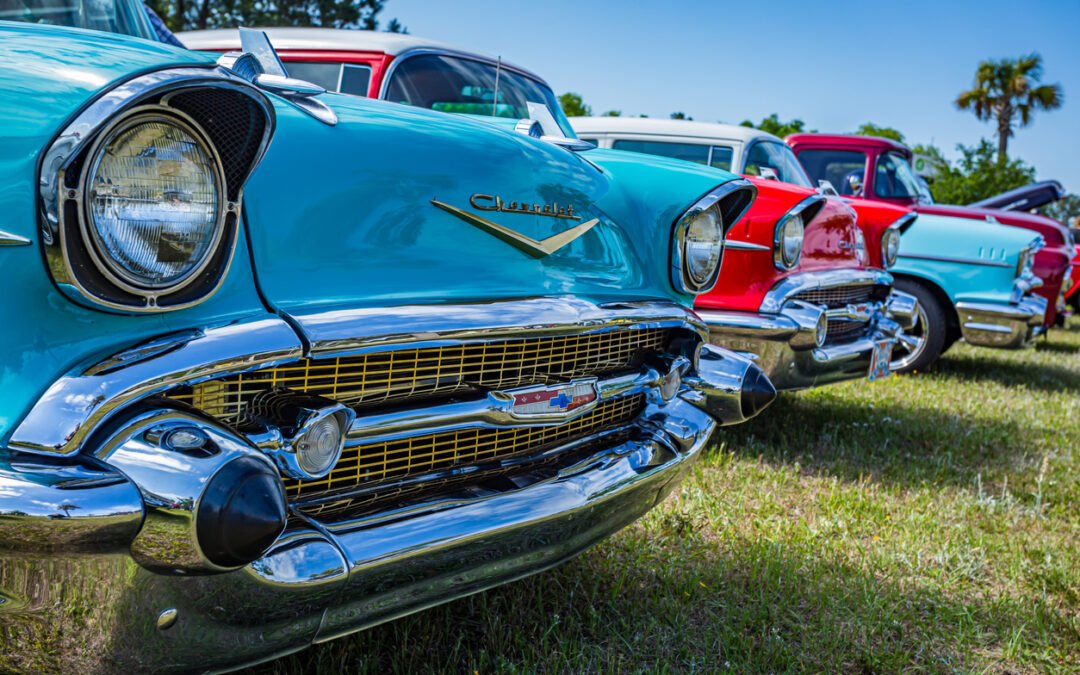When a vintage set of wheels rolls past, you can’t help but turn and admire the craftsmanship and history behind it. Your passion for collector or antique cars might be to attend car events with other car enthusiasts, or to simply enjoy with your friends and family. For those who love their cars and the history behind them, owning or collecting classic cars is a very rewarding experience. In this article, we will help you understand the categories of classic cars, and explain how to know if you qualify for classic car insurance in Ontario. We’ll assist you in finding the right amount of coverage you’ll need in order to protect your investment and passion.
What is a “classic car”?
What some consider a classic car may not be true for other car enthusiasts. Definitions of a classic car can vary, but the Insurance Information Institute (III) says a car is known as a classic when it’s at least 25 to 30 years old. The following types of vehicles may have coverage from classic car insurance in Canada:
Collector and classic cars manufactured in 1979 or before, including:
- Antique – Cars built between 1896 to 1948.
- Classics – Built between 1924 and 1948 featuring custom coachwork.
- Post-war – Popular cars manufactured in the years following World War II.
- Muscle cars – American made, V-8 engine cars made between 1968 and 1972.
- Collector trucks and SUVs that are 25 years or older (stock), or 15 years or older (with modifications).
- Military vehicles – Retired, demilitarized vehicles from 1985 and older.
- Classic and antique tractors – Restored vintage models 30 years of age and older.
- Car trailers for vehicles and street rods.
- Retired commercial vehicles that are 25 years or older.
- Classic vehicles under construction for active restoration projects.
What is classic car insurance?
Classic car insurance protects you from financial losses against classic cars that are driven for pleasure or investment purposes. Many drivers make the mistake of insuring their vintage vehicle with a standard auto insurance policy. However, there are considerations that should be understood when choosing coverage.
What does it cover?
Classic car insurance typically includes coverages similar to a standard car insurance policy:
- Collision
- Comprehensive
- Property damage
- Bodily Injury Liability
Traditional cars are insured based on their Actual Cash Value which factors in depreciation. Classic car insurance covers the vehicle for an amount that’s agreed upon by the owner and the insurer. If the value of your classic car increases over time, you can adjust your coverage limits to reflect its value. Classic car insurance also helps pay for:
- Specialized repairs or restoration: If your classic car is damaged. These costs are often significantly higher than the cost of repairing a regular car.
- Helps pay to replace classic parts. This may include wheels and engine components, which can be difficult to find and expensive to buy out-of-pocket.
Does regular car insurance cover a classic car?
Standard car insurance may provide some coverage for a classic car, but it may not cover the full value of the vehicle. That’s because standard policies take age, mileage and depreciation into account when determining how much a car is worth. But if a classic car has been customized or restored, for example, it may be worth more than its depreciation value. Therefore, a regular car insurance policy may not be enough to help cover the cost of repairs after an accident.
Qualifications for Classic Car insurance
For the same coverage as a standard auto policy, classic car insurance can cost a quarter of what the same vehicle would cost to insure through a standard policy. You should be aware that there are qualifications and restrictions for classic car insurance that must be considered before applying. Before you can obtain classic car insurance, you must meet some basic requirements. Here are several criteria you and your car must meet in order to qualify:
- The insurance company must recognize the vehicle as a classic.
- A clean driving record, with no more than two minor convictions.
- All drivers must have a minimum of at least 10 years of driving experience.
- You can only use the car for occasional, pleasure driving. It cannot be used as a day-to-day vehicle.
- You must also have another passenger vehicle insured (under a separate policy) as a daily driver.
- Depending on the insurance company, they may require you to store the car in a garage (or storage facility) to reduce the chances of theft, damage or wear.
- Some policies have an annual mileage restriction, and require that the car remain in North America.
- Racing, track and off-road activities are forbidden.
- You must have the Agreed Value of Automobile (OPCF 19A), which indicates the value of the car (only for insurance purposes), along with an appraisal report. The key feature and benefit of a classic car insurance policy is that the insurance company assigns the vehicle an agreed replacement value in the event of pay out for a total loss. Your insurance company can provide a list of appraisers who they work with. An appraisal costs around $200.
Stock or modified?
Most insurance companies who offer classic insurance have two different categories for hobby cars:
- Antique/classic/stock: This applies to vehicles 25 years of age and older that have mainly original equipment or equivalent.
- Special interest: This applies to modified vehicles, aged 15-24 years, and older cars that are customized.
Premiums for classics are less than special interests, however both categories are based on the appraisal value. Simply put, the more your car is worth, the higher the premium. Some insurers allow you to drive the vehicle to car shows and auto club events. If not, you may need to purchase special coverage for those kinds of trips.
How much does it cost to insure a classic car?
Despite the value of classic cars, you may be surprised to hear they are usually cheaper (up to 75% less) to insure than regular vehicles. This means your classic car insurance is likely to be cheaper than standard car insurance. This is because:
- These vehicles see very little use, and
- Their owners tend to keep them in excellent shape. It’s a fact that well-maintained cars are safer cars.
You may pay as little as $300 to $1,000 approximately per year. The cost of a classic car premium depends on factors such as the vehicle’s value and the number of vehicles you want to insure. Insurers know that your classic car is often used for leisure, so they’re usually associated with a lower risk level.
Where can I get it?
There are a handful of insurance companies in Ontario that offer classic/antique auto policies. There are plenty of options out there, and sometimes it can feel a bit daunting trying to decide where to start your search and who to go with. According to Canadabuzz.ca, here are some collector car insurance companies in Canada that can assist you:
FYI: Aviva Canada Inc. joined forces with Hagerty Insurance Agency, the world’s leading provider of collector vehicle insurance to allow Canadians access to Hagerty collector vehicle insurance. Under the partnership, (through Elite Insurance Company), Aviva Canada underwrites Hagerty Insurance in Canada.
If you have a vintage or classic vehicle that is seeing road time this summer, be sure that you have proper coverage. Unsure where to look? Speak to one of our representatives to make sure you are getting the best price for your classic car insurance coverage. Contact us at isure today!




